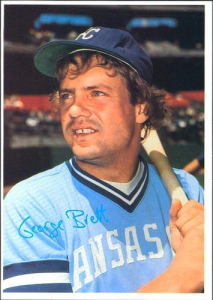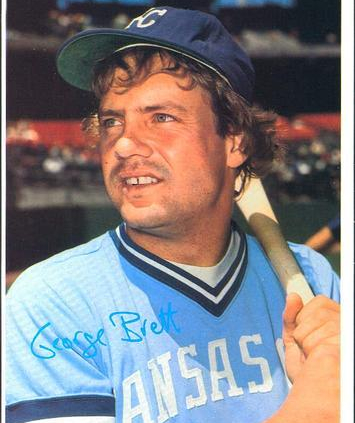July 31, 1980: Royals score baker’s dozen against Red Sox as George Brett raises average to .390
 Going into the final game of the Kansas City Royals’ three-game series against the Boston Red Sox in July 1980, one word could be used to describe the weather, the Royals, and several of their hitters: hot. A 99-degree game-time temperature and 13 runs later, that word still applied, as the Royals thumped the Red Sox, 13-3.
Going into the final game of the Kansas City Royals’ three-game series against the Boston Red Sox in July 1980, one word could be used to describe the weather, the Royals, and several of their hitters: hot. A 99-degree game-time temperature and 13 runs later, that word still applied, as the Royals thumped the Red Sox, 13-3.
Kansas City had held first place in the American League West since May 23. The Royals’ July record so far was 17-9, and they had a commanding 11½-game lead over the second-place Oakland A’s.
No Royal was hotter than third baseman George Brett. The 27-year-old Brett had hit an astonishing .488 in 20 July games, boosting what had been a .337 batting average to .386, and came in with a 12-game hitting streak. Speedy 25-year-old center fielder Willie Wilson added a .335 batting average and was leading the major leagues in hits (146) and runs scored (81).
The Red Sox were fifth in the AL East, 11½ games behind the first-place New York Yankees. The task of cooling off Brett, Wilson, and the rest of the red-hot Royals fell to future Hall of Famer Dennis Eckersley, who, after two straight seasons of finishing in the top 10 of the AL Cy Young Award voting, was struggling with a 6-9 record and a 4.59 ERA. Opposing him was Dennis Leonard, the durable right-hander who was headed for his third 20-win season for the Royals.
After Leonard worked around a harmless one-out single by Dave Stapleton to hold the Red Sox scoreless in the top of the first inning, Wilson led off the bottom half. Eckersley said afterward that the key to slowing down the Royals was “keeping Wilson off base before Hal] McRae and [George] Brett get up,”1 but that plan went up in smoke on the third pitch of the game.
Wilson bounced a routine groundball back to Eckersley, but he couldn’t field it cleanly, and by the time he recovered, the speedy Wilson beat his wild throw to first.2 It was ruled a single, the first of several controversial rulings by the official scorer.
One pitch later, Wilson easily stole second base, his 46th steal of the season. When catcher Dave Rader’s throw went into center field, Wilson came around to score the game’s first run.
Though Eckersley set down Brett on a fly ball and limited the first-inning damage to just one run, this pattern—the Red Sox being retired scoreless and the Royals scoring in their half of the inning—held for nearly the entire game. Neither team scored in the second, but the Royals increased their lead to 2-0 in the third inning when Eckersley’s feared scenario of Wilson reaching base happened again. With two outs, Wilson singled to center and scored easily on a double by McRae.
The Royals doubled that lead in the fourth as Eckersley continued to labor. He surrendered a double to John Wathan to start the inning. After Wathan advanced to third on a groundout by Clint Hurdle, second baseman Frank White attempted a suicide squeeze down the first-base line.
Chasing the ball from his position behind home plate, Rader decided his best play was to wait and hope that the ball rolled foul, but it didn’t, giving White an RBI single as Wathan came home from third.3 Another stolen base, this time by White, and Wilson’s third single in as many plate appearances produced another run and a 4-0 Royals lead.
Leonard continued to limit Boston’s chances to score. Having allowed only one hit and one walk through the first four innings, he gave up one of each in the fifth, but got out of the inning when Brett turned Glenn Hoffman’s grounder into an inning-ending 5-4-3 double play. “They hit a lot of first pitches,” Leonard said after the game. “But they hit them right at somebody most of the time.”4
Brett’s single in the bottom of the inning, which pushed his hitting streak to 13 games,5 started a string of four Royals singles in a row, producing their fifth run and ending Eckersley’s night. He was replaced by Win Remmerswaal, who ended the inning without any further scoring, but then ran into trouble in the sixth inning.
Singles by U.L. Washington and Willie Wilson—his fourth single of the day—brought up McRae with no one out. He hit what seemed to be a routine fly ball into right-center field. Right fielder Dwight Evans called for it and lined up to make the catch, only to have center fielder Fred Lynn collide with him in his own attempt to field it.
The ball rolled away as both men—who combined for 12 career Gold Gloves—fell to the ground, allowing both baserunners to score and giving McRae enough time to circle the bases for what was initially ruled a four-base error.
The ruling enraged McRae and many other Royals. After the game, Wilson said, “Now you know why we like to play on the road. We get more hits.”6 White felt the same way. “We get much better scoring on the road. I don’t know if the guy who’s doing the scoring7 is watching the game or not.”8
The play was later changed to an inside-the-park home run after the scorer spoke with Evans, who said, “We both called, but neither of us heard the other. It was a freak thing. How often do we collide?”9
Back on the field at Royals Stadium, the inning continued to spin out of control for Remmerswaal, who walked Brett and gave up a single to Darrell Porter before being removed in favor of Bill Campbell. A wild pitch and a double by Willie Aikens made the score 10-0.
Leonard went back out for the seventh inning, working around two singles to keep his shutout hopes alive and bringing the Royals’ hitters back to do more damage. The Red Sox defense helped them again. After a one-out walk to Wilson, McRae hit a groundball to shortstop that Hoffman fumbled, allowing both runners to reach safely. Brett followed with his second hit of the day, driving in Wilson and raising his batting average to .390, as he attempted to become the first player since Ted Williams in 1941 to bat .400 for a season.10 A sacrifice fly scored pinch-runner Rusty Torres with the Royals’ 12th run, and a single by Aikens scored Brett to make it a baker’s dozen.
The final two innings would not change the outcome but did provide three notable events. First, the Red Sox finally scored in the eighth, on Stapleton’s triple and Lynn’s RBI groundout, ending Leonard’s hope of throwing his third shutout of the season.
In the ninth, Royals manager Jim Frey replaced Leonard with rookie Jeff Twitty, who was making his fourth major-league appearance.11 Jim Rice hit a towering home run to straightaway center field, a blast that took one bounce off the grass berm beyond the fence before hitting the base of the giant crown scoreboard.12 It was Rice’s first home run since he returned four days earlier from the disabled list, having missed five weeks after a pitch from Chris Knapp of the California Angels chipped a bone in his wrist.13
One out later, Evans hit a ball to right center field that nearly caused the second outfield collision of the day. While Wilson avoided running into right fielder Hurdle, the ball glanced off his glove, allowing Evans to reach third. Again the scoring would be called into question; it was originally ruled an error, further infuriating the Royals. “You can’t be happy about having a good night when you have to argue with the official scorer,” said Wilson.14
Once again, the ruling was eventually changed, giving Evans a triple. When he scored on Rader’s groundout, it made the final score 13-3.
The victory closed the Royals’ 10-game homestand with a 7-3 record and increased their division lead 12 to games over Oakland. It was their 18th win of July.15 Kansas City continued to roll in August, racking up a 23-7 mark. The Royals won the division by 14 games over the A’s, then beat the Yankees in the American League Championship Series for the franchise’s first-ever pennant.16
Acknowledgments
This article was fact-checked by Laura Peebles and copy-edited by Len Levin.
Sources
In addition to the sources cited in the Notes, the author consulted Baseball-Reference.com and Retrosheet.org for any pertinent information, including the box score and play-by-play.
https://www.baseball-reference.com/boxes/KCA/KCA198007310.shtml
https://www.retrosheet.org/boxesetc/1980/B07310KCA1980.htm
Notes
1 Peter Gammons, “Royals Rip Hapless Red Sox, 13-3,” Boston Globe, August 1, 1980: 31.
2 Wilson entered the game second in the American League in stolen bases with 45, one year after leading the league with 83 steals.
3 Gammons, “Royals Rip Hapless Red Sox, 13-3.”
4 Del Black, “Official Scorer Upsets McRae; Royals Win,” Kansas City Times, August 1, 1980: D-1.
5 Brett’s hitting streak eventually reached 30 games, from July 18 through August 18. He hit .467 during the streak.
6 Cindy Boren, “If Steamed-Up Royals Were to Make Ruling, the Call Surely Would Be: E-Official Scorer,” Kansas City Star, August 1, 1980: C-1.
7 The official scorer was Alan Hoskins of the Kansas City (Kansas) Kansan.
8 Boren, “If Steamed-Up Royals Were to Make Ruling, the Call Surely Would Be: E-Official Scorer.”
9 Gammons, “Royals Rip Hapless Red Sox, 13-3.”
10 Though his average would reach as high as .407 on August 26, and would still be above .400 as late as September 19, Brett finished the season exactly where he was after this game—with a .390 batting average.
11 Twitty appeared in 13 games with the Royals in 1980, his only major-league season.
12 That is the author’s personal recollection of the home run; he attended the game and witnessed it.
13 Larry Whiteside, “Rice Will Miss at Least Three Weeks,” Boston Globe, June 23, 1980: 30.
14 Boren, “If Steamed-Up Royals Were to Make Ruling, the Call Surely Would Be: E-Official scorer.”
15 The Red Sox were 50-49 overall, and fell to sixth in the AL East.
16 Kansas City lost the 1980 World Series to the Philadelphia Phillies, four games to two.
Additional Stats
Kansas City Royals 13
Boston Red Sox 3
Royals Stadium
Kansas City, MO
Box Score + PBP:
Corrections? Additions?
If you can help us improve this game story, contact us.


